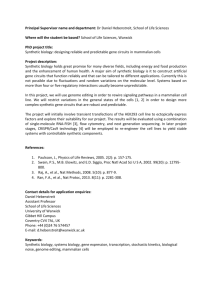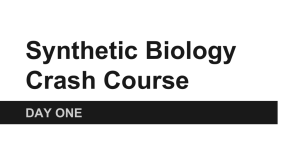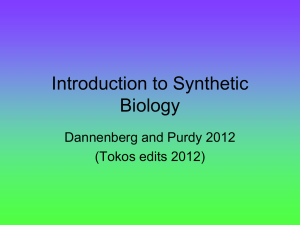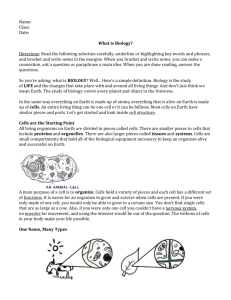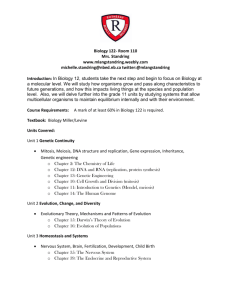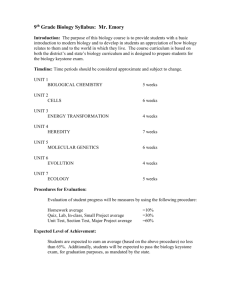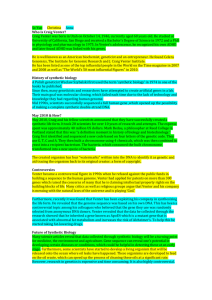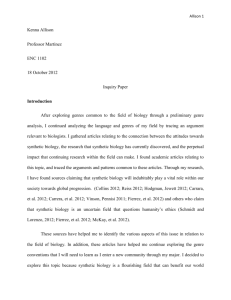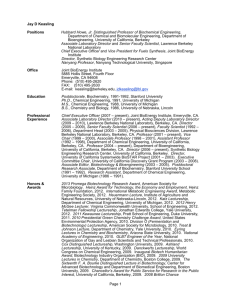Imperial College of Science, Technology and Medicine
advertisement
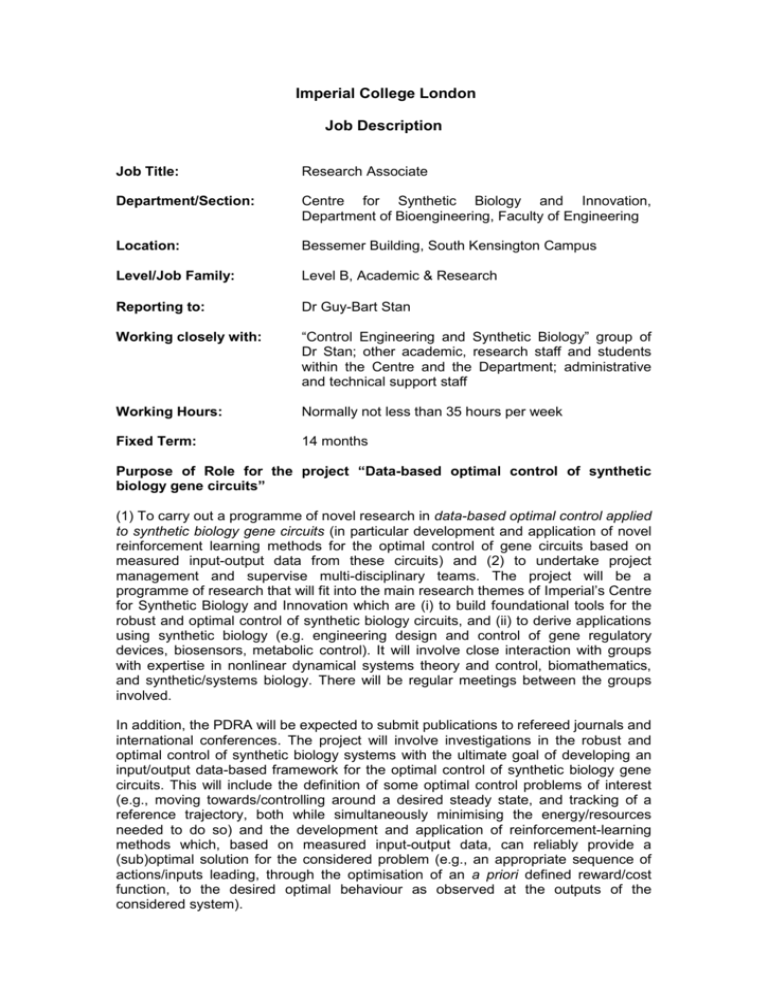
Imperial College London Job Description Job Title: Research Associate Department/Section: Centre for Synthetic Biology and Innovation, Department of Bioengineering, Faculty of Engineering Location: Bessemer Building, South Kensington Campus Level/Job Family: Level B, Academic & Research Reporting to: Dr Guy-Bart Stan Working closely with: “Control Engineering and Synthetic Biology” group of Dr Stan; other academic, research staff and students within the Centre and the Department; administrative and technical support staff Working Hours: Normally not less than 35 hours per week Fixed Term: 14 months Purpose of Role for the project “Data-based optimal control of synthetic biology gene circuits” (1) To carry out a programme of novel research in data-based optimal control applied to synthetic biology gene circuits (in particular development and application of novel reinforcement learning methods for the optimal control of gene circuits based on measured input-output data from these circuits) and (2) to undertake project management and supervise multi-disciplinary teams. The project will be a programme of research that will fit into the main research themes of Imperial’s Centre for Synthetic Biology and Innovation which are (i) to build foundational tools for the robust and optimal control of synthetic biology circuits, and (ii) to derive applications using synthetic biology (e.g. engineering design and control of gene regulatory devices, biosensors, metabolic control). It will involve close interaction with groups with expertise in nonlinear dynamical systems theory and control, biomathematics, and synthetic/systems biology. There will be regular meetings between the groups involved. In addition, the PDRA will be expected to submit publications to refereed journals and international conferences. The project will involve investigations in the robust and optimal control of synthetic biology systems with the ultimate goal of developing an input/output data-based framework for the optimal control of synthetic biology gene circuits. This will include the definition of some optimal control problems of interest (e.g., moving towards/controlling around a desired steady state, and tracking of a reference trajectory, both while simultaneously minimising the energy/resources needed to do so) and the development and application of reinforcement-learning methods which, based on measured input-output data, can reliably provide a (sub)optimal solution for the considered problem (e.g., an appropriate sequence of actions/inputs leading, through the optimisation of an a priori defined reward/cost function, to the desired optimal behaviour as observed at the outputs of the considered system). Research Duties: to work in close cooperation with Dr Stan as formal supervisor, other research staff, students and collaborators on the project to submit publications to refereed journals to present findings to colleagues and at conferences to take initiatives in the planning of research to contribute in writing bids for research grants to work as part of a team and to be open-minded and cooperative to generate and display results and interpret their implications to produce accurate report-ready data and to assist in the preparation of written progress reports as required to maintain accurate and complete records of all findings to help with the teaching and administration of the research group to undertake instruction of PhD students as agreed to provide guidance to staff and students to direct the work of small research teams including undergraduate and postgraduate students and to motivate others to produce a high standard of work to attend progress and management meetings, regular laboratory meetings, journals clubs and internal and external seminars, as required to attend relevant workshops and conferences as necessary to develop contacts and research collaborations within the College and the wider community to help with the planning and design of appropriate experiments and to identify and develop suitable techniques for the collection and analysis of data to take responsibility for organising resources and effective decision making in support of research to promote the reputation of the Group, the Department and the College to perform other reasonable tasks related to the furtherance of the project aims Other Duties: to undertake appropriate administration tasks to attend relevant meetingsto undertake any necessary training and/or development programme any other duties commensurate with the grade of the post as directed by line manager / supervisor to comply with relevant College policies, including Financial Regulations, Equal Opportunities Policy, Promoting Race Equality Policy, Health and Safety Policy, Information Systems Security Policy and Intellectual Property Rights and Register of Interests Policies Imperial College London is committed to equality of opportunity and to eliminating discrimination. All employees are expected to adhere to the principals set out in its Equal Opportunities in Employment Policy, Promoting Race Equality Policy and Disability Policy and all other relevant guidance/practice frameworks. Job descriptions cannot be exhaustive and the post-holder may be required to undertake other duties, which are broadly in line with the above key responsibilities. Person Specification Applicants are required to demonstrate that they possess the following attributes. Qualifications Essential: Applicants should hold a PhD in Computer Science, Control Engineering, Machine Learning, Computational Biology or closely aligned disciplines, or an equivalent level of professional qualifications and experience. Previous experience in optimal control, sequential decision-making, multistage stochastic programming, nonlinear dynamical systems, stochastic modelling of gene expression or equivalent research, industrial or commercial experience. Knowledge / Experience Essential: Research experience in Reinforcement Learning / Optimal Control / Sequential Decision Making / Multi-Stage Stochastic Programming Experience in: Modelling, analysis and simulation of nonlinear dynamical systems in biology -- stochastic and deterministic Knowledge of: Key concepts in systems biology, metabolic networks and genetic regulation networks Programming in relevant high level programming languages (Matlab®, Mathematica®, R), and in C/C++ The mathematical theory underlying stochastic processes and nonlinear dynamical systems Experience in some of the following techniques: Handling of large and structured data sets Logical or qualitative modelling of biological systems, in particular gene regulation networks and metabolic networks A successful track record in academic publications Ability to work effectively with researchers from a broad range of disciplines Desirable: Research experience in a Synthetic Biology environment Experience in: Supervising or helping with the supervision of research students Conducting a detailed review of recent literature Competent deployment of numerical and simulation methods Analysis of biological data Collaborating with experimental biomedical scientists Knowledge of: Gene regulation in prokaryotes Light inducible gene expression systems Skills and Abilities Essential: High level of analytical capability Ability to develop and apply new concepts and methods Computational capabilities (scientific programming, modelling, analysis, control, sequential decision making, multi-stage stochastic programming) Willingness to work as part of a multidisciplinary team and to be open-minded and cooperative Creative approach to problem solving Excellent verbal communication skills and the ability to communicate complex information clearly Strong written communication skills and the ability to write clearly and succinctly for publication Ability to direct the work of a small research team and motivate others to produce a high standard of work Ability to organise own work with minimal supervision Ability to prioritise own work in response to deadlines Ability to work autonomously and show initiative with research Discipline and regard for confidentiality and security at all times Willingness to undertake any necessary training for the role Commitment to meeting deadlines Flexible attitude towards work The appointee will be expected to display a high level of motivation, and to be a career-oriented person Desirable: Willingness to travel both within the United Kingdom and abroad to conduct research and attend conferences/workshops and other meetings Ability to assess resource requirements and deploy them effectively Ability to encourage research culture in others
